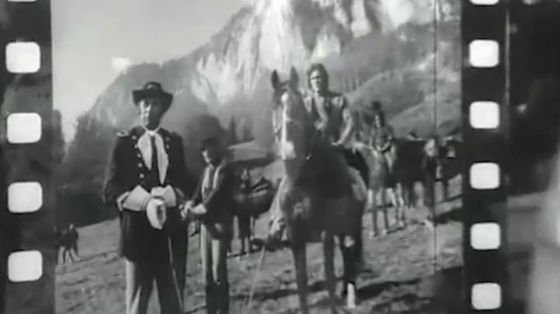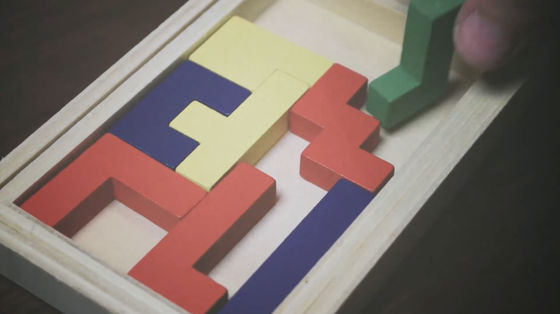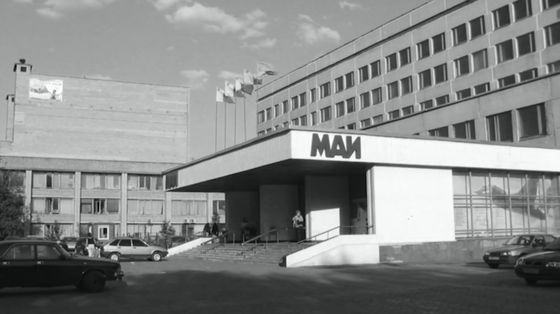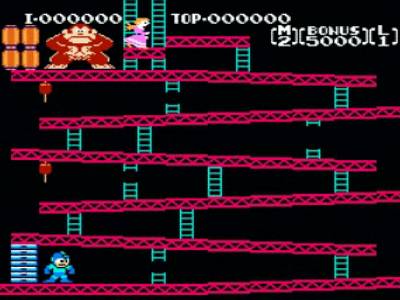What is the unknown history of the world puzzle game "Tetris"?

"Tetris"Is a famous puzzle game where stacks of various shapes falling down from the top are stacked and scores are disappeared and scored when rows are aligned. Tetris is supposed to have played once by everyone, this is a game born in the Soviet Union (Soviet Union), a movie that spotlighted such unknown history of Tetris is on the YouTube site .
The Story of Tetris | Gaming Historian
In 1984 when the Cold War of Soviet Union and America continued, we developed a puzzle game with computer programmer Alexei Pasitnov living in the USSR. Mr. Pazitonov, born in Moscow in 1956, is raised between a mother of a movie writer and a father of a philosopher, but parents divorce when Mr. Pazitonov is 11 years old.

Mr. Pazitonov who was taken over by mother was blessed with the opportunity to see various movies due to the work of mother, and among them "James BondI thought that was favorite.

Also, for children of the Soviet Union with less amusementPentominoIt was said that Puzzle Game was also a few pleasures, and Mr. Pazitonov was also playing this as a matter of course. Pentomino is a game that combines 12 blocks in a frame, which is a very simple puzzle.

In the process of rocket development with the United States and the competition of space development, the Soviet Union, which had been urgently urged to train computer engineers, had developed a policy to let children learn computers from a young age. Mr. Pasitnov, a 17-year-old fascinated by an airplane, will also study computers in Moscow's flight laboratory.

Even after leaving the laboratory, Mr. Pazitonov gained his career as a computer programmer and in the Soviet Union he was at a state-of-the-art site at the time.

Mr. Pasitnov shares one desk with three people and seems to have been living a regular life every day, but one of them will be paid one computer each. The computer that was paid was a previous era when viewed from now and could only display letters on the display, but considering that we still worked against the huge mainframe, it was a very big progress did.

Mr. Pazitonov seems to have been engaged in the development of voice recording software and so on, but the Soviet programmers at that time often used computers for private side projects even after the work was finished. Mr. Pazitonov also said that he was using the computer outside of his work hours for personal reasons.

A side project that Russian programmers were eagerly working on, development of computer games. It seems that they tried to recreate overseas computer games that they were spending time trying to finish their work.

While many programmers were trial and error trying to make copy games, Mr. Pazitonov aimed for original game development and also formed a team with three people, also computer programmers Dmitry Pavarovski and Bajim Jerashimov, It was said that he was in development of.

They exchanged brainstorming day and night and presented new game ideas. Mr. Pazitonov was a scientist of the Soviet Union and could not sell packaged software, but he said he was still keen on developing games that can be run on a computer.

In such a case Psitonov remembered that Pentomino was playing around the time of childhood. Mr. Pazitonov thought how to manage this into a computer game somehow.

Mr. Pazitonov reduced the 12 blocks used for pentomino to seven and somehow developed the first game.

That is to apply 7 blocks in the frame, Mr. Pazitonov named "Gene Engineering" in this game, but there was one big problem.

That problem is "boring". It became too simple and obviously gaming nature, so now if the player completes the puzzle once, you will not feel like playing again twice.

Mr. Pazitonov then expanded the frame to fill the screen and devised a way to drop the block randomly from the top. Although it turned out to be a rewarding game, it seems that the game has ended as soon as the screen is full.

So, Mr. Pazitonov came up with a mechanism that "When blocks are arranged in a row, they disappear". By doing this, in principle it will be possible to continue playing endlessly without terminating the game.

Mr. Pazitonov was playing the game completed in this way, but the problem also occurs here.

Even if I got crazy about games, I kept playing games even when it was time to start work, and other staff members got me angry.

Mr. Pazitonov named "Tetris" in a wonderful game that is too strongly addictive and can be played without difficult explanations. "Tetris" is a coined word that combines the Greek word "Tetra (number 4)" with Mr. Pazitonov's favorite sports "Tennis (tennis)".

Tetris was a major outbreak among Soviet scientists, but Tetris only worked on outdated Soviet computers. Therefore, Mr. Pazitonov said that he did not anticipate that he will play Tetris other than some computer programmers.

However, Mr. Pazitonov considers that Tetris will spread more if it runs on computers made by IBM that are also obtainable by some computer programmers. So I asked my fellow Jerashimov to say, "Can you port Tetris to IBM made computers?"

Mr. Jerashimov created a program that runs even on computers made by IBM at the end of his struggle, and further equipped with a gimmick that adds more addiction, such as color coding for each block, retention of high scores and more.

Mr. Pasitnov, who thought that this could go on, tried to sell software, but at that time in the Soviet Union at that time there were few people selling software, Tetris made in the Soviet data center was legal Will be registered as an intellectual property of the Soviet Union.

In the end, Mr. Psitonov said that he could only do what it was to distribute Tetris copied to the hardware at the game / fair to those who were interested.

Meanwhile, Ms. Vladimir Pokkuko, a friend of Mr. Pazitonov and a doctor, gets Tetris hardware. Mr. Pokkuko, fascinated by its overwhelming addiction, copied this for his colleagues.

Because Tetris was so popular, Mr. Pokkuko, who decided that this would hurt his work, discarded the copy. Still many times Tetris was prevalent in the hospital, Mr. Pokkuko was surprised at that addictive every time. People who try to play no matter how many times they abandoned are attracted much attention, Mr. Pokyuko thought "This can be used for addictive experiments".

And in 1986 Tetris spread to the people of the society, Mr. Pasitnov could not get the money by this, but he seems to be very satisfied.

Tetris spread to Western countries also because Robert Stein, owner of Hungarian software company Andromeda Software, found Tetris.

At that time, Hungary became an exchange point between Western countries and eastern countries, Mr. Stein, a Hungarian businessman, learns that the game, which is a research institute of the Soviet Union, is prevalent.

That is Tetris. Mr. Stein was not a gamer, but once he played Tetris, he was surprised at the addictive nature and he was convinced that "this can be sold".

Mr. Stein tried to get a license of Tetris and sell it to a game production company and get copyright royalties, trying to get a Tetris license with that hand. However, the Soviet Union at that time was in a closed state, and the negotiations were difficult.

Finally Mr. Stein who was able to contact with Mr. Pazitnov of the developer. Mr. Pazitonov received contact, "It is possible to sell hardware of Tetris as seen in my dreams!" I was extremely pleased.

Mr. Pazitonov sent "Yes" reply to Stein, who immediately sold Tetris' rights to British mirror software company. However, in fact Mr. Stein got from Mr. Pazitonov only "Yes" like a mouthfulness. In the Soviet Union at that time there was no person who exchanged license agreement for the game, so Mr. Pasitnov naturally had no knowledge of anything related to the game license.

As a result, Mr. Stein contacted the Soviet Union many times and wanted a signature on the contract, but Tetris' rights were sold and spread, with no clear signature.

Tetris "Iron curtain"Exotic game came from the other side" was also released in the United States, Russian-style music epidemized to BGM.

In 1988 when Tetris began to appear on the western market, Stein said "ELORG (Soviet Foreign Trade Association)"Since Tetris is illegal at present, I want to negotiate again" from the agency of the Soviet Union.

The fact that Mr. Pazitonov had neither a license contract nor knowledge about copyright was conscious, and it came here and it was able to disturb the problem.

Mr. Stein said, "Mr. Pazitonov got consent and I did not know the organization named ELORG", but negotiations with ELORG follow a parallel line.

Ultimately, taking into consideration that "Tetris has already been on the market a lot," settled in the form of selling copyright to Mr. Stein.

Tetris caused a big boom, and reviews were praised one by one that praised its addictiveness, such as "It takes only a few minutes to memorize play but it keeps playing for several hours in a row and" It is a trap to lower the productivity of the United States of America "etc. It was.

However, even after Mr. Stein obtained certain rights from ELORG, since Tetris' rights are very fragmented from original / IBM ported version, arcade version, consumer version and it is difficult to negotiate with ELORG, It was in a state of very complicated.

Among such complex rights relationships, American game companiesTengenI received a license from the arcade version of Tetris was sellingSegaStart mass production of Tetris' mega drive ported version. Actually, however, it was found that licenses possessed by TENGEN did not give permission for the mega drive transplant version, and there was a situation that it suddenly encountered the sorrow of release discontinuation.

In 1989, three people including Mr. Stein of Andromeda Software, Mr. Hank Rogers of Nintendo, Kevin Maxwell of British company Miller Software Co., Ltd. arrived in Moscow in 1989 respectively. Direct negotiations with ELORG begin.

When Mr. Rogers of Nintendo entered ELORG headquarters, he felt the atmosphere that he was not welcomed at all.

ELORG license manager Nikolai Berikov accepts the visit, Mr. Rogers will meet with Mr. Velikoff.

Mr. Rogers handed out Famicom Cartridge of Tetris which had already been on sale, but Mr. Velikoff has never assigned a console version license so far. "Why is there such a thing?" Mr. Velikoff stuck this, but Mr. Rogers explained that Tetris' rights relationship is very complicated.

ELORG → Andromeda · Software → Miller software company in the United Kingdom → Tengen in the United States → Vallet proof · Software is in a state that licenses are delivered to the wind one by one and it is decided that Mr. Velikoff Tell you.

Mr. Velikoff is puzzled by the company name that has never seen or heard of Tengen. In the first place ELORG only sold the rights as a computer game to Andromeda Software, it was a story I did not know about selling video games at all.

The next day, Mr. Rogers again held a meeting with Mr. Velikoff, and in addition to Mr. Velikov et al. ELORG members, Mr. Pasitnov of the developer also attended.

Mr. Rogers tells members of ELORG who do not know about Nintendo and Nintendo, "want to sell Gameboy version" and "how much tradeoff can be assumed if you license Nintendo rights." Mr. Velikoff, who decided that a considerable profit could be expected, will lean towards Tetris' rights to Nintendo.

Furthermore, Mr. Rogers and Mr. Pazitonov of Tetris developer keep talking even after the meeting is over, and they are spirited. While having drinking vodka in Moscow, he told various conversations about the outlook of Tetris.

Mr. Stein of Andromeda Software was defeated in the initial negotiation negotiation, negotiations were difficult.

MillerSoft confirmed the negotiations with president Robert Maxwell having a connection with the Russian government, but he was confident that he sold the video game version without warning to ELORG .

Nintendo finally presented a huge license agreement, gained sales rights for the Game Boy version.

In addition, we decided to license Nintendo licenses for home game machines, and notified Mr. Miller Software and Stein.

Mr. Stein said that he was furious, "I was deceived by Nintendo and Russia," but he barely holds the right for the arcade version and computer version of Tetris.

MillerSoft puts pressure on Mr. Velikoff by using the connection with the Russian government but Mr. Verikoff was convinced that the benefit that Nintendo brings is better than the benefit MirrorSoft brings.

The requested Gorbachev is in the process of collapse of the Soviet Union and is not on its way.

Nintendo, in the summer of 1989,NES (NES)Decided to release version. At the same time, as evidenced by the contract of rights received from Russia, "ELORG has not allowed anyone to sell video game versions", sued Tengen for copyright infringement of Tetris and won the victory.

Nintendo, which put Tetris' right in the hand, released Game Boy with Tetris and sold about 35 million Tetris bundled Game Boy. It seems that in return the victory of winning the fierce Tetris' rights fight that the country and the company had mixed together was reasonably large.

However, even though we lost the right, the same is true for other game companies gaining huge profits from Tetris.

Except the developer Mr. Pazitonov.

Mr. Pazitonov is currently working with Mr. RogersThe Tetris CompanyEstablished. By doing this, developer Mr. Pasitnov finally became profitable by Tetris.

Even though ELORG became a private company, he also continues to receive the enormous profits raised by Tetris under Mr. Velikoff.

It is Tetris that everyone has played, but in the background it seems there was a battle between a really complicated country and a company / human.

Related Posts:







